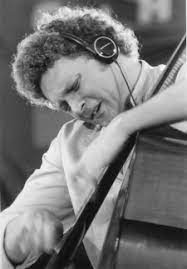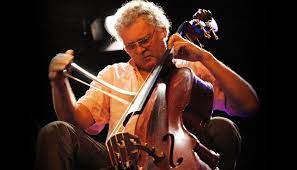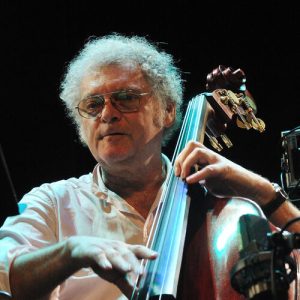HIT CHANNEL EXCLUSIVE INTERVIEW: March 2016. We had the great honour to talk with a legendary jazz bassist: Miroslav Vitous. He is best known as a founding member of Weather Report. He has a very successful solo career since 1969 and has also played with Miles Davis, John McLaughlin, Chick Corea, Larry Coryell, Jack DeJohnette, Jan Hammer and many others. Ιn 2009, he released his latest album, “Remembering Weather Report”. Read below the very interesting things he told us:
 What are the current projects you are involved in?
What are the current projects you are involved in?
At the moment, I am writing a symphony. I work with many people. I released an album called “Wings” with Polish saxophone player, Adam Pierończyk. I do things in the Czech Republic and of course I am continuing my career outside of the Czech Republic playing with duos, trios, quartets, quintets. I have a concert coming up in June for European Legends. There is an organization which decided about musicians who deserve to be called “legends”. So, they have decided that Miroslav Vitous is a legend of European jazz because of what I have accomplished in my life. This is taking place in Gütersloh, near Hannover in Germany on June 25. It’s a big deal. They will make a book and a CD about it. I think the television will film the concert. There are a lot of projects. There is a quintet in which I am playing. And of course I have other projects going on as I go on.
Can you describe to us your musical vision on “Remembering Weather Report” (2009) solo album?
The basic idea of Weather Report when I was in the band, was that the role of the bass was to make other musicians communicate directly. Because I didn’t play the role of the bass like I would play drums, “boom-boom-boom-boom”, you know. I played motifs which would confront Wayne Shorter (saxophone) and Joe Zawinul (keyboards) and they had to start a conversation. This was the original idea of Weather Report. It seems that they dismissed that idea for some commercial or whatever direction after I left Weather Report. So now, on this album “Remembering Weather Report” I made compositions which are not exactly Weather Report, but some of them are. I think “Nefertiti” is a very good example of executing this song. So, I did that on “Remembering…” and this is not basically the reason, but this is the way how it was. Consequently, there is an album coming out, “Music of Weather Report” by ECM, just two months from now. It’s an album by me with a quintet, which is actually playing music of Weather Report including “Birdland”, “Pinocchio”, my songs from the Weather Report days and other things. It further exposes the freedom of the expression. “The freedom of the performers” would be a better description. It’s not a “toun-toun-toun-toun” thing. The music is living and moving in ways that the motifs require. Just what the music wants to do. This is what they are doing. But this wasn’t the case when Weather Report wrote those tunes (ed: after his departure). They had a great potential of music but they didn’t show this potential. They moved to a commercial way. If you will hear “Birdland” in two or three months, when the album comes out, you will understand what I am saying.
Why you decided to use different line-ups on “Universal Syncopations” (2003) and “Universal Syncopations II” (2007) albums?
Because each album has what it requires. The “Universal Syncopations”, the original one, with Jack DeJohnette, Chick Corea, Jan Garbarek and John McLaughlin leads to another way. They were more like my guests on the ideas which I had. The “Universal Syncopations II” is the orchestra version of my vision of the music which I was performing at the time. It’s a completely different thing. There was a reason to do something with the orchestra, because it wasn’t enough to do it with a band.
Are you proud of the classic album status that “Infinite Search” (1969) has?
Very much so. It’s a classic album which brings the quality of the European music in American jazz in the finest way.
 You spent many years working on Miroslav Vitous Symphonic Orchestra Samples. Was it a difficult process to do that?
You spent many years working on Miroslav Vitous Symphonic Orchestra Samples. Was it a difficult process to do that?
Yes it was, because it took almost 15 years. It is now completed. I have now a fine orchestra at home under my fingers. Now, I am writing a symphony. This is why I did all this for about 15 years. Now, I can have a whole orchestra playing the music which comes to me. Which I hear and I can play, as it comes. I don’t have to write it with a pencil. For me, you have to hear it as it comes. If you don’t do it, it doesn’t come. With a pencil, it doesn’t come. You just write something with a pencil. You just write notes with a pencil, you know what I mean. Pencil is not enough for projecting music, unless you have a genius like Mozart. It’s not possible to do that.
How did it happen to play with Miles Davis at New York’s The Village Gate in 1967?
It happened this way: I was in Chicago at the London House club with Clark Terry Quintet, as Miles came to Chicago to play a festival at the Opera House the same night. The whole band after the concert came to the club in Chicago, which was called London House. It was a very high society, very high level club. And Miles came to this club, that night and asked me if I would like to play with him. This is actually the way it happened. The interesting thing is that the next night the same thing happened with Herbie Mann. Herbie Mann came at the London House and came to me after the concert and said: “Would you be interested in joining my band?” and I said: “Yes”. So, it was like they were two miraculous days. In two days everything opened up completely wide in my career and everything. They were two miraculous days.
Herbie Hancock (Miles Davis Quintet’s pianist) later told you that the band had been extremely creative that week. Did you feel the same?
Well, to tell you the truth I didn’t know, because I didn’t know how they played before me and after me. But I learned through Herbie that I was a part of this creative process. I think Miles Davis wrote that in his autobiography, yes.
Do you think “Live in Tokyo” (1972) is the best example of what Weather Report were about?
At the time, perhaps yes.
 Why you decided to leave Weather Report in 1972?
Why you decided to leave Weather Report in 1972?
There was a disagreement which had to do with the music itself. Number one thing was that Joe Zawinul wanted to go to a commercial way. He wanted to go to black funk music and I wasn’t born for that. I was born for other things. This disagreement was very large. Also, there was problem because my talent at the time was projecting so much, that it was very difficult for my bass playing to fit in a group. If you listen carefully to the recordings and the music which happened at the time, you will notice that the bass is giving the direction where the music is going to go. Because the bass is demanding some expression from the other instruments. It is not playing the bass role. So, I think Joe Zawinul didn’t like that very much because he wanted to be the main force which would decide where each instrument would go. He wanted a commercial direction for the group in order to be more commercially successful and more financially successful. And this is exactly what happened. So, this is why we split up at that point.
How important was Willis Conover’s “Jazz Hour” on Radio Free Europe to you, as a young musician?
It was immensely important not only to me, but to other musicians in Europe. I’m sure. It was immensely, immensely important.
Is there still room for experimentation in jazz music?
So, I ‘ll put it this way: The jazz music as we call it, which is bebop, post-bop and modern jazz is finished. Some people try to play modern jazz, ethnic and world music but they don’t know what they are playing. They don’t have the basis for it. They don’t have the musical personality, I would say. The people I have played with like Herbie Hancock and Wayne Shorter are musical statues. They weren’t just players, they were musical personalities. They were much, much more. They didn’t just play the saxophone or whatever. They were musical statues because of what they accomplished and what they said. They were giants of music. But now you have people who try to play the bebop, the jazz or whatever who are not musical giants. They just talk about something and try to do something. But to answer your question the jazz is dead, is finished.
Why do you believe that disco destroyed everything?
It was a matter of business because all the recording companies were looking for sales. They were not looking for artistic value or artistic input. They were looking for sales. I have seen that many musicians have actually completely disappeared after this period of disco.
Do you feel lucky that you played with so many great musicians?
Yes, I feel extremely lucky. I came to America at a spacetime that I had a chance to play with all these musicians. There is no other musician who came from Europe and played with all these musicians. I played with Herbie Mann, Blue Mitchell, Lee Morgan… I cannot tell you with how many musicians I have played in America. I can tell you that I am bringing the knowledge of American jazz music into the future because I experienced it and I played the jazz. I knew them, I loved them and they loved me. It was great.
 Both John McLaughlin and Larry Coryell played with Jimi Hendrix. Had you ever met Jimi?
Both John McLaughlin and Larry Coryell played with Jimi Hendrix. Had you ever met Jimi?
No, I did not.
Did you like Jaco Pastorius as a bass player?
Yes. Not only as a bass player, but also as a musician and a visionary in music. I think he was a fantastic musician. I met him in Berlin at a jazz festival and we had a wonderful conversation. That’s when I met him and I didn’t see him then. I have heard from his friends that I was his idol. What he was trying to do on electric bass is what I play actually on acoustic bass.
A huge “THANK YOU” to Mr Miroslav Vitous for his time and to Ilse Weinmann for her valuable help.
Official Miroslav Vitous website: http://www.miroslavvitous.com

